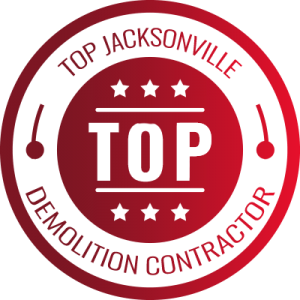



Old commercial buildings in Jacksonville carry a lot of history, but with age comes challenges. One of the most common issues that property owners face in these older structures is foundation damage. Over time, even the strongest buildings can start to shift, settle, or crack, and that can cause problems from the ground up. Whether you’re planning a renovation or preparing for demolition, it’s important to understand how foundation problems can affect your plans.
Foundation issues don’t just make a property unsafe. They can also slow down a demolition project, cause delays in construction, or increase overall costs if not managed early. In Jacksonville’s warm, humid climate, shifting soils and water intrusion are constant risks to older buildings’ structural integrity. Knowing where to look and how to assess the severity of damage can make a big difference in how smoothly your commercial demolition project goes.
Identifying Common Foundation Problems
Spotting foundation problems in older commercial structures isn’t always easy. Some signs are obvious. Others can be hidden under flooring or behind walls. Being aware of what to look for helps prevent bigger problems down the road.
Here are a few signs that a building’s foundation may be failing:
– Cracks in the foundation or interior walls, especially near doorways or windows
– Floors that slope, sag, or feel uneven when walking across them
– Doors or windows that suddenly stick or no longer close the way they should
– Water entering the basement or crawl space, which can lead to mold growth or wood damage
These issues might seem minor at first, but they’re often warning signs of deeper problems. Let’s say you walk through an old office building and notice that the hallway slopes slightly downward. It’s easy to brush it off as old construction quirks, but this sort of tilt could mean that the foundation has shifted over time. Left unchecked, that can undercut the stability of the entire structure, making future demolition more complicated and risky.
Causes of Foundation Issues
Foundation trouble doesn’t usually come out of nowhere. Older commercial buildings in Jacksonville are especially vulnerable to a range of local factors that contribute to slow but steady deterioration.
Here are a few of the most common causes tied to Jacksonville’s climate and soil types:
– Poor soil conditions: Some types of soil can’t support heavy structures over time and may expand or shrink depending on moisture levels
– Water drainage issues: If a property doesn’t pull water away from the foundation properly, it can lead to soil erosion and weakening of the base
– Aging materials: Foundations built decades ago were often made with materials that don’t hold up well under extreme weather or pressure
– New development nearby: Large-scale construction next door can cause vibrations or displace soil, stressing adjacent foundations
Foundation damage tends to build slowly, but it’s always working in the background. Add in Jacksonville’s high water table and occasional heavy rainstorms, and it becomes even more important to pay attention to minor changes in the building’s structure.
Assessing the Severity of Foundation Damage
Once you’ve spotted potential warning signs, the next step is to find out how bad the damage really is. Not all cracks or uneven floors require immediate action, but you won’t know that without an inspection.
Here’s how to get a clear idea of what you’re dealing with:
– Walk the building and take note of any damage, both cosmetic and structural
– Bring in a professional structural engineer to assess the integrity of the foundation
– Learn the difference between problems that just look concerning and ones that are truly dangerous
Some cracks are hairline and harmless, caused by natural settling. Others are wide and spreading, pointing to a major shift underneath. Having a team that understands the unique conditions in Jacksonville helps ensure you’re not misjudging the risk. Being proactive can help you plan a safer and smoother demolition when the time comes.
Steps to Address Foundation Problems Before Demolition
When an old commercial building in Jacksonville is set for demolition, dealing with its foundation problems at the start can stop bigger issues from spiraling later. Trying to demolish a structure with serious foundation damage without a clear plan creates safety concerns and could lead to more time and cost down the line.
Start by making the building safe for everyone working onsite. If there’s serious cracking or sagging, structural support may be needed before any heavy machinery starts moving. Reinforcing damaged spots or limiting access to unstable areas keeps crews protected during prep.
Next, build out a proper demolition plan based on what’s been found during inspection. Every commercial site is different, and Jacksonville’s properties deal with specific soil and weather concerns. A solid demolition plan should reflect any hazards linked to the existing foundation. It should also include a step-by-step breakdown of how the building will come apart while keeping heavy equipment and materials clear of unstable zones.
Don’t forget about local rules. Before any demo begins, the right permits must be pulled. Jacksonville has its own set of demolition regulations, and if foundation problems are involved, extra scrutiny from inspectors is possible. Sticking to the codes from the start will help you avoid project delays.
It’s just as important to partner with a demolition team that understands how to handle structures with compromised bases. They can help project managers figure out what demolition techniques are safest and most efficient based on the level of foundation damage.
Prioritizing Safety and Efficiency During Demolition
Foundation damage can add layers of risk, so approaching the demolition with caution is key. Having safety protocols in place is the best way to avoid accidents. Crews should be trained to spot tell-tale signs of structural stress during the tear-down process. If something shifts unexpectedly or an undiagnosed crack opens, having a plan stops things from going sideways quickly.
Methods also matter. A building with an unstable base may not react to force the way a stable one would. Techniques like controlled deconstruction might be a better option for part of the process instead of full mechanical demolition straight away. Knowing when to slow down and assess is just as important as when to ramp things up.
Make sure environmental safety is part of the workflow too. Foundation damage may have allowed water in over the years, which often brings mold or weakened materials. This can affect air quality and cleanup afterward. Hazardous materials should be removed and contained properly to keep workers protected and the site clean for what comes next.
Ensuring a Smooth Demolition Process
Once demolition begins, staying on track means staying consistent with communication. Regular check-ins between the job site and the planning team help make sure foundation-related surprises don’t throw everything off. If signs of more damage show up mid-project, that feedback loop allows for quick adjustments.
Here’s what helps keep things running without issues:
– Set up daily progress meetings or briefings
– Keep backup equipment on-site in case anything stalls unexpectedly
– Document every change or roadblock related to the foundation
– Be flexible with your timeline if deep structural issues are worse than expected
Once demo is done, clear out every part of the foundation, including any underground elements. Don’t assume old footings or slabs can stay. If they’re cracked or weakened, they don’t make a good base for future builds and can affect stability later. The cleaner and more prepared the site is afterward, the less time you’ll waste when starting the next project phase.
Preparing for the Future: Building on a Strong Foundation
Looking ahead, rebuilds in Jacksonville benefit from stronger planning when it comes to soil prep and foundation work. Pick licensed contractors who’ve worked with commercial properties in the region. They’ll often know to expect challenging conditions like sandy or shifting earth that make deeper footing or extra drainage necessary.
Keep water away from the new foundation by grading land properly and checking that all drainage systems work. Gutters, trenches, and ground slopes should all lead water away from the building, not toward it. Foundation coatings or moisture barriers can offer added security against leaks, especially during hurricane season or heavy downpours.
Inspections shouldn’t stop once the new build is done. Scheduling regular site inspections helps catch early signs of shifting or wear before they turn into major issues. It’s easier and cheaper to catch a problem early than to deal with it after years of being overlooked.
Laying the Groundwork for Successful Demolition
Demolishing a commercial building with foundation damage is never routine, especially in a place like Jacksonville where climate, soils, and age complicate planning. But ignoring those foundation issues can lead to cost overruns, serious safety problems, and long-term rebuilding delays. That’s why it’s so important to slow down, look closely, and make educated decisions from the start.
By tackling foundation problems head-on and building smart strategies around them, project leaders can avoid common pitfalls. Instead of reacting to things as they happen, you’ll be several steps ahead, making your demolition project safer, cleaner, and more efficient all the way through.
For specialized support with your project, trust Elev8 Demolition to ensure everything runs smoothly. Ready to streamline your next project and turn challenges into progress? Learn how we can support your commercial goals through professional demolition in Jacksonville.

